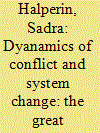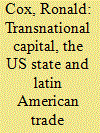| Srl | Item |
| 1 |
ID:
052559


|
|
|
| 2 |
ID:
144542


|
|
|
|
|
| Summary/Abstract |
Through an investigation of the Shenzhen Collective Consultation Ordinance and the Guangdong Regulations on the Democratic Management of Enterprises, this article demonstrates how transnational capital in China deploys its associational power alongside its structural economic power to lobby and pressure the national and local governments to advance its own interests. In addition, building upon the ideas of Hall and Soskice about the varieties of capitalism, the authors have developed the concept of “varieties of transnational capital” to account for the differing positions of overseas business associations regarding the two laws. We find that these positions are shaped by two determining factors: a) where the associations are situated in global production chains, and b) the industrial relations model in their home countries.
|
|
|
|
|
|
|
|
|
|
|
|
|
|
|
|
| 3 |
ID:
085187


|
|
|
|
|
| Publication |
2008.
|
| Summary/Abstract |
This paper examines the role of US-based transnational corporations in advancing trade, investment, regulatory and intellectual property rights provisions within NAFTA and DR-CAFTA. I explore the linkages between US firms, the US state and investment patterns in Mexico, Central America and the Dominican Republic in order to develop a framework for understanding the political economy of these regional trade agreements. I locate the timing of each of these agreements within the context of the goals of a transnational interest bloc that includes US-based transnational firms, US state officials and regional business interests and state bureaucracies in Latin America, with each trying to utilise regional agreements as a substitute for failed multilateral initiatives as well as a springboard for advancing a more aggressive set of protections for investors within bilateral investment treaties. In order to determine the extent to which transnational firms based in the USA have influenced these trade agreements, I explore three interrelated aspects of business influence: the extent to which transnational firms with investment interests in Mexico and Central America were involved in organisations that had regular access to key US policy makers; the historical development of a transnational interest bloc that has linked US firms and the US state to transnational capital and state bureaucracies in Mexico, Central America and the Dominican Republic; and the extent to which the same group of transnational firms has been attempting without success to advance a policy agenda in the WTO that incorporates many of the provisions of NAFTA and DR-CAFTA. The failure of this transnational interest bloc to effect substantial changes in WTO policies has led the bloc to rely on regional trade agreements to pursue its interests.
|
|
|
|
|
|
|
|
|
|
|
|
|
|
|
|